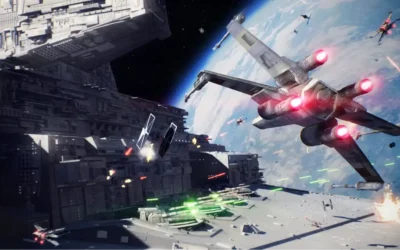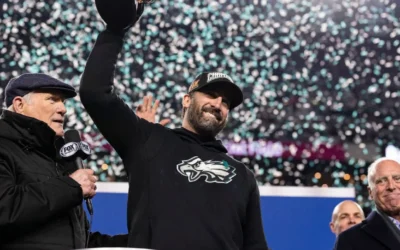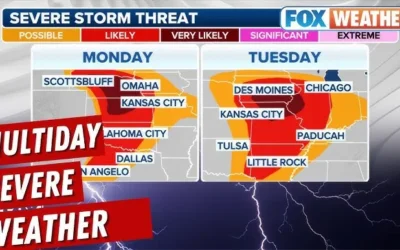David Leitch Takes the Helm for Netflix’s ‘Gears of War’ Movie
In a major development for fans of epic video game adaptations, David Leitch, the director known for his work on blockbuster hits like Deadpool 2 and John Wick, is in talks to direct Netflix’s highly-anticipated film adaptation of the iconic video game series Gears of War.
The Promise of Grit and Action
Gears of War first captured the hearts of gamers when it launched in 2006, setting a new standard for cooperative gameplay and storytelling in video games. Combining intense combat, a compelling narrative, and stunning visuals, the franchise quickly became a staple of the gaming community, with a loyal fanbase hungry for more. With Leitch at the helm, expectations for a gritty, action-packed adaptation are high.
David Leitch’s Vision for the Project
Known for his distinctive style that merges thrilling action sequences with a strong narrative approach, Leitch is expected to bring his unique flair to Gears of War. His previous work has consistently demonstrated a keen understanding of what audiences want in an action film, and his involvement raises questions about how he will channel the raw intensity of the game into a cinematic experience.
Reports indicate that Leitch is already deep in discussions about the direction of the film, outlining how he plans to respect the source material while making it accessible to a broader audience. The balance between appealing to die-hard fans of the franchise and attracting newcomers will be crucial to the film’s success.
A Growing Trend of Video Game Adaptations
The Gears of War movie is part of a larger trend within the film industry, where studios are increasingly turning to video game franchises for inspiration. In recent years, titles like Resident Evil, Uncharted, and The Witcher have made their way to the big screen and streaming platforms, often to mixed reviews. However, with Leitch’s proven track record, there’s hope that the Gears of War adaptation will set a new standard for quality video game films.
What to Expect from the Adaptation
While plot details remain under wraps, there is plenty of source material to pull from. The original Gears of War game follows the Delta Squad, an elite unit of soldiers battling for humanity’s survival against a monstrous race known as the Locust Horde. Characters like Marcus Fenix, Dom Santiago, and Baird offer rich stories that can easily translate to a film script.
Fans are eager to see how the character dynamics, emotional stakes, and high-octane action sequences are adapted for the big screen. The video game series is known for its gritty, emotional depth and brotherhood themes, which Leitch could explore in a compelling manner. By diving into character backstories and motivations, the film could resonate strongly with viewers.
Implications for Future Projects
Leitch’s involvement with Gears of War could also pave the way for more ambitious adaptations of other beloved video games. The director’s success could open doors for sequels or spin-offs if the film proves to be a box office hit. Additionally, it could encourage other studios to invest more heavily in creating quality adaptations, ultimately benefiting fans and the film industry as a whole.
The Role of Netflix in the Streaming Wars
As a prominent player in the streaming landscape, Netflix has been keen on establishing its dominance through original content. Partnering with Leitch for Gears of War is a strategic move that positions the platform to attract both gamers and action film enthusiasts. With a vast collection of shows and films leaning heavily on nostalgia, the service aims to capture absorbed audiences seeking quality programming.
With the success of existing adaptations like The Witcher and new content on the horizon, Netflix’s approach toward video games may give them an edge in the increasingly competitive streaming market.
A Fanbase on Edge
The excitement surrounding the announcement of Leitch as the director is palpable. Fans are hopeful that this adaptation will honor the game’s legacy while delivering the sort of iconic visuals that the franchise is known for. As the release date approaches, speculations continue to swirl around casting, potential cameos from beloved characters, and how closely the story will adhere to the game’s original plot.
Moreover, the director’s experience in crafting compelling action scenes will likely resonate with audiences who expect visually stunning cinematography. With his ability to create tension and excitement on screen, Leitch’s vision may breathe fresh life into the venerable franchise.
What This Means for the Future of Game Adaptations
The selection of a director of Leitch’s stature indicates an increasing seriousness within Hollywood towards adapting video game narratives into film and television. No longer seen as a niche market, the melding of video games with mainstream cinema is expanding. Leitch’s involvement may signal a future where quality storytelling and character development become as crucial as action and visual effects.
With the recent success of video game adaptations paving the way for more projects, it remains to be seen whether this trend will continue. Adaptations like Gears of War could hold the key to establishing a new genre – one that blends video game storytelling artistry with cinematic mastery.
Final Thoughts
In an era where every successful franchise is under scrutiny for cinematic translation, David Leitch’s engagement with Netflix for the Gears of War adaptation offers a beacon of hope. As discussions and pre-production ramp up, anticipation for the film continues to grow.
For gamers and movie buffs alike, the convergence of storytelling that transcends media boundaries could reinvent how stories are shared and experienced. Following Leitch’s proven track record of delivering thrilling narratives, one can only hope that Gears of War emerges as a watershed moment in video game adaptations.
As we look toward the release, there’s a palpable excitement that David Leitch’s version of Gears of War will not only honor the source material, but will also set a new benchmark for future adaptations in the industry.







